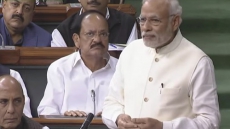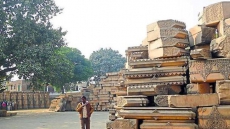In a decision that may allow families to reconnect, the Indian government has reviewed the Adverse List containing as many as 314 blacklisted foreign nationals from the Sikh community and brought it down to just two.
As a result, such Sikh foreign nationals become eligible to avail visa services to visit their families in India.
A government statement said, "This review is a continuous and dynamic process and is a part of a regular exercise. Such a review will afford an opportunity to such Sikh foreign nationals to visit India, meet their family members and reconnect with their roots."
During the Punjab militancy in the 1980s, many Sikh Indian nationals fled India to escape authorities after they fell for anti-India propaganda. During those tumultuous years, many became foreign nationals or took asylum outside India.
The Indian government placed them in the Adverse List till 2016. It made them ineligible to avail visa services to visit India.
"One major issue coming in the way of grant of consular/visa services to asylees and their family members, mostly belonging to Sikh community, was maintenance of local adverse lists by Indian missions. This practice has also been discontinued," said the government in a statement.
All Indian missions and posts abroad have also been advised to grant "appropriate visa to all categories of asylees" and family members whose names do not figure in the Central Adverse List. This will be done in line with the procedure followed for other categories of applicants of that nationality.
Not just that, all categories of asylees who were blacklisted in a way for a long time, will also now be eligible to apply for registration as Overseas Citizen of India (OCI) cardholders. But this can only happen after they have applied for and held normal visas for a period of two years, said the government.
PUNJAB CM HAILS DECISION ON BLACKLISTED FOREIGN SIKHS
Punjab Chief Minister Amarinder Singh on Friday hailed the Centre's decision to scrap the controversial blacklist, which was totally discriminatory towards the Sikh community, in response to the state's persistent demand and efforts.
Conceding the demand, the Centre has virtually done away with the list, that comprised 314 Sikh foreign nationals, with only two names of men not connected with Punjab now left on it.
The Central government has also discontinued the practice of maintenance of local adverse lists by the respective Indian Missions in various countries.
In a statement, the Chief Minister thanked the Central government for finally conceding the state's demand for more or less revoking the list, thus making Sikh foreign nationals eligible for availing visa services to visit their families in India and reconnect with their roots.
His government, said Amarinder Singh, had worked actively with the Centre for scrapping the list, created by the Central government and its agencies in 2016.
Every Sikh had the right to visit Punjab and the Darbar Sahib, including those who had gone astray in the surcharged atmosphere of the 1980s and 1990s, particularly in the wake of the Operation Bluestar and the anti-Sikh riots, said the Chief Minister.
He said the decision would go a long way in bringing those members of the Sikh community, who had fled the nation as a result of the circumstances, to connect with their families back home.
The creation of the blacklist had been a regressive move, which needed to be corrected in the larger interest of the community, whose contribution to the growth and development of India, and the nations in which they were settled, was exemplary, said Amarinder Singh.
By removing all the 312 India-origin Sikhs from the list, the government had accepted his government's reasoning that cutting off the Sikh foreign nationals from their roots would only lead to their further alienation, which would serve no good to the country, he added.

